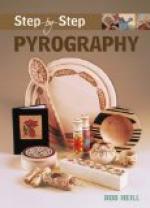Eleanor looked very grave and responsible. She saw long years of work before her, occupied with the triumphant career of the soldier-saint. But the new work proved so fascinating that an hour had gone by before she knew it. It was hard to tear herself away and go down to the chilly stone hall. She was not expected to come very near the fire of blazing logs, and felt her grandmother’s eye constantly upon her lest she should not sit erect or behave as a well-born maiden should. She felt also that if Lady Ebba knew how much time would be consumed by the adventures of Saint George, she would begin a calculation of the number of skeins of linen thread that might be spun in that time, to the enrichment of the family. Eleanor privately thought that there was bed-linen in the castle to last for at least twenty years—which was true.
Letters had been received at the castle that day. Sir Walter was on his way home, and with him an English knight who had been his friend for many years—ever since they were squires together in Normandy. Lady Philippa looked rather sad and wistful when she spoke of Sir Hugh l’Estrange. He had married her dearest childhood friend, Alazais de Montfaucon, and Alazais was dead. She had gone a bride into that foreign land, lived seven happy years, and died. Eleanor could not help wondering whether she should ever have any friends who were dear to her as these early friends were to her father and mother. She had never played with any other children at all.
The news of her father’s coming had traveled more slowly than he himself did. The next day, while Eleanor and her mother were busy transplanting some asphodel, the horn blew at the gate, and in a few minutes the knight came striding across the turf and caught his wife in one arm and his daughter in the other. Behind him was a great tall man with laughing eyes and a rather sad mouth, and standing very straight and soldierly beside the stranger was a boy some two years older than Eleanor, whom Sir Hugh introduced as “my son, Roger.”
The following days were so full of excitement that little time was left for the tapestry chamber. The two knights were on their way southward to meet King Henry and aid him to pacify some of his turbulent subjects. Roger was to be left at the castle. It was usual for a knight to send his sons to some friend for training during the years when a boy must learn the duties of page and esquire. In this case there was more than usual reason for it, for Sir Hugh’s castle was in a remote part of England and it would not be safe to leave his only son there during his absence.
Roger himself, while he frankly admitted that he did not much like leaving England, was keenly interested in all that he saw and heard. Soon it seemed as if he had always been at home in the old Norman castle. He called Lady Ebba “grandame,” as Eleanor had never dared to do, and though she was as strict with him as she was with every one else, she never seemed exactly displeased with him. Roger himself saw it.




